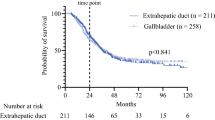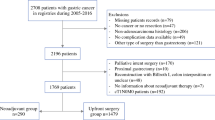Abstract
Background
The clinical outcome of malignant biliary obstruction caused by metastatic gastric cancer remains unclear. This study was designed to evaluate the clinical outcome and predictive factors of survival in patients who underwent percutaneous transhepatic biliary drainage (PTBD) for malignant biliary obstruction caused by metastatic gastric cancer.
Methods
Between April 1997 and March 2006, 38 consecutive patients with malignant biliary obstruction caused by metastatic gastric cancer were retrospectively analyzed. All patients underwent PTBD.
Results
After PTBD, serum bilirubin levels significantly decreased in 29 (76%) of 38 patients. Pruritus, fever, jaundice, anorexia, abdominal pain, and general fatigue improved significantly in 100%, 100%, 78%, 64%, 53%, and 48% of patients, respectively. Early complications related to the intervention occurred in ten patients. Seven patients developed symptoms of recurrent jaundice or cholangitis. Overall median survival was 79 days, and 6-month and 1-year survival rates after PTBD were 39.5% and 13.2%, respectively. Serum bilirubin level after PTBD (P < 0.0001), chemotherapy after PTBD (P < 0.0001), and performance status at presentation (P = 0.0363) were found to be independent predictors of survival.
Conclusion
PTBD with metallic stent placement is a safe and effective palliation for patients with malignant biliary obstruction caused by metastatic gastric cancer. Our results suggest that patients in good clinical condition are candidates for aggressive treatment with a combination of PTBD with metallic stent placement and chemotherapy.

Similar content being viewed by others
References
Papachristou D, Fortner JG (1978) Biliary obstruction after gastrectomy for carcinoma of the stomach. Surg Gynecol Obstet 147:401–404
Lokich JJ, Kane RA, Harrison DA et al (1987) Biliary tract obstruction secondary to cancer: management guidelines and selected literature review. J Clin Oncol 5:969–981
Anderson ID, Manson JM, Martin DF et al (1993) Relief of metastatic biliary obstruction by stent placement: is it worthwhile? Surg Oncol 2:113–117
Rieber A, Brambs HJ (1997) Metallic stents in malignant biliary obstruction. Cardiovasc Intervent Radiol 20:43–49
Inal M, Akgül E, Aksungur E et al (2003) Percutaneous self-expandable uncovered metallic stents in malignant biliary obstruction. Complications, follow-up and reintervention in 154 patients. Acta Radiol 44:139–146
Indar AA, Lobo DN, Gilliam AD et al (2003) Percutaneous biliary metal wall stenting in malignant obstructive jaundice. Eur J Gastroenterol Hepatol 15:915–919
Brountzos EN, Ptochis N, Panagiotou I et al (2007) A survival analysis of patients with malignant biliary strictures treated by percutaneous metallic stenting. Cardiovasc Intervent Radiol 30:66–73
Kim GE, Shin HS, Seong JS et al (1994) The role of radiation treatment in management of extrahepatic biliary tract metastasis from gastric carcinoma. Int J Radiat Oncol Biol Phys 28:711–717
Makino T, Fujitani K, Tsujinaka T et al (2008) Role of percutaneous transhepatic biliary drainage in patients with obstructive jaundice caused by local recurrence of gastric cancer. Hepatogastroenterology 55:54–57
Chu KM, Law S, Branicki FJ et al (1998) Extrahepatic biliary obstruction by metastatic gastric carcinoma. J Clin Gastroenterol 27:63–66
Lee BH, Chin SY, Kim SA et al (1995) Obstructive jaundice in gastric carcinoma: cause, site, and relationship to the primary lesion. Abdom Imaging 20:307–311
Iwasaki M, Furuse J, Yoshino M et al (1996) Percutaneous transhepatic biliary drainage for the treatment of obstructive jaundice caused by metastases from nonbiliary and nonpancreatic cancers. Jpn J Clin Oncol 26:465–468
Brountzos EN, Petropoulos E, Kelekis NL et al (1999) Malignant biliary obstruction: management with percutaneous metallic stent placement. Hepatogastroenterology 46:2764–2771
van Delden OM, Laméris JS (2008) Percutaneous drainage and stenting for palliation of malignant bile duct obstruction. Eur Radiol 18:448–456
Okamoto T, Yanagisawa S, Fujioka S et al (2006) Is metallic stenting worthwhile for biliary obstruction due to lymph node metastases? J Surg Oncol 94:614–618
Kawamoto H, Ishii Y, Nakagawa M et al (2003) Analysis of longterm survivors with expandable metallic stent inserted for malignant biliary stenosis. J Hepatobiliary Pancreat Surg 10:95–100
Marsh WH, Cunningham JT (1992) Endoscopic stent placement for obstructive jaundice secondary to metastatic malignancy. Am J Gastroenterol 87:985–990
Author information
Authors and Affiliations
Corresponding author
Rights and permissions
About this article
Cite this article
Migita, K., Watanabe, A., Yoshioka, T. et al. Clinical Outcome of Malignant Biliary Obstruction Caused by Metastatic Gastric Cancer. World J Surg 33, 2396–2402 (2009). https://doi.org/10.1007/s00268-009-0186-0
Published:
Issue Date:
DOI: https://doi.org/10.1007/s00268-009-0186-0




